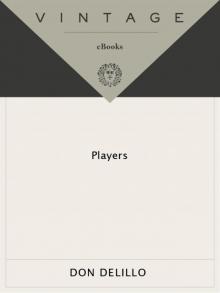- Home
- Don DeLillo
Players Page 5
Players Read online
Page 5
“The floor,” he said.
Her reply made no sense. It went right through him, suffused with light. He leaned closer and renewed his smile, warmly. This would keep him from blinking. He blinked only with tight smiles, for emphasis.
“The Exchange,” he said. “You’ve seen me outside Zeltner’s office. I know, people you’ve seen just once, hard to place, I realize. Is there the subway? I’ll walk along. Where do you live? Queens, I’ll wager. I like it out there, despite people saying Queens, what, where, my God. It’s metaphysical.”
“I usually get a ride.”
“I understand there’s a certain insecurity in the Zeltner power alley. You’ve been up there how long now? Let’s stand over in the shade. Queens is endless. This endless something about it. It’s like a maze without the interconnections. A bland maze. I have a theory about where people live in New York.”
She wore a white blouse, pleated blue skirt and white shoes. As he talked and then listened he tested himself by recalling the VW’s license number. It completed a mental set. They walked slowly to the corner where she’d been picked up the day before.
“This is where my ride should come.”
“Is it all right if I wait?”
“I guess.”
“What’s your name?”
“Rosemary Moore.”
“I have to be up there tomorrow after the close. Maybe I’ll stop by if you’re not busy. We can stop off after you’re through. Would that be all right? A drink or two. A quick drink as they say. Tiny. A tiny drink. They serve only tiny drinks.”
This time she got into the back seat. A man and woman were in front, both somewhat older than she was, Rosemary Moore in navy and white.
5
Pammy examined the uses of boredom. Of late she’d found herself professing to be bored fairly often. She knew it was a shield for deeper feelings. Not wishing to express conventional outrage she said again and again, “How boring, so boring, I’m bored.” Pornography bored her. Talk of violence made her sigh. Things in the street, just things she saw and heard day to day, forced her into subtle evasions. Her body would automatically relax. To feel this slackening take place was to complete another weary detour.
People talked to her on the bus, strangers, a little detached in tone, a little universal, sometimes giving the impression they were communicating out to her from some unbounded secret place.
Flying made her yawn. She yawned on the elevators at the World Trade Center. Often she yawned in banks, waiting on line to reach the teller. Banks made her guilty. Tellers and bank officers were always asking her to sign forms, or to resign forms already bearing her signature, or to provide further identification. It was her own money she wanted to draw out, obviously, but there was still this bubble of nervousness and guilt, there was still this profound anxiety over her name, her handwriting, there was still this feeling that the core content of her personality was about to be revealed, and she would stand on line with two dozen others, roped in, yawning decorously, a suspect.
Pammy heard Lyle in the corridor outside, She leaned forward and closed the toilet door. He entered the apartment, walked down the hall, stopped outside the door, then opened it. She made a monkey face and uttered a series of panicky squeals, bouncing on the seat. He closed the door and went into the bedroom.
She called out: “What’d you get me for Valentine’s Day?”
“A vasectomy,” he said. “Is this February?”
“I only wish.”
“Why?”
“So our vacation would be over.”
“Why?”
“Because I know we’re not going to take one.”
“You go.”
“What will you do?”
“Work,” he said.
She came out of the bathroom. He followed her into the kitchen zipping up lightweight cords, his pelvis drawn back to avoid the primal snare. They jostled each other before the open refrigerator.
“Goody, cheddar.”
“What’s these?”
“Brandy snaps.”
“Triffic.”
“Look out.”
“No you push me, you.”
They went into the living room, each with something to eat and drink. Lyle turned on the new television set and they watched the evening news. Pammy became embarrassed on behalf of someone being interviewed, a man with a minor speech defect. She put her hands over her ears and looked away. The air conditioner made loud noises and Lyle turned it off. Then he went into the bedroom and watched television in there for a while.
“Are you watching this?” she called out.
“What, no.”
“The beauty technician.”
“No.”
“Put it on quick.”
“Gaw damn, Miss Molly, a man can’t watch but one thing at a time.”
“Put it on, on seven.”
“Later, I’m watching.”
“Now,” she said. “Hurry. Hurry up. Quick, seven, you dumb.”
Embodied in objects was a partial sense of sharing. They didn’t lift their eyes from their respective sets. But noises bound them, a cyclist kick-starting, the plane that came winding down the five miles from its transatlantic apex, rippling the pictures on their screens. Objects were memory inert. Desk, the bed, et cetera. Objects would survive the one who died first and remind the other of how easily halved a life can become. Death, perhaps, was not the point so much as separation. Chairs, tables, dressers, envelopes. Everything was a common experience, binding them despite their indirections, the slanted apparatus of their agreeing. That they did agree was not in doubt. Faithlessness and desire. It wasn’t necessary to tell them apart. His body, hers. Sex, love, monotony, contempt. The spell that had to be entered was out there among the unmemorized faces and uniform cubes of being. This, their sweet and mercenary space, was self-enchantment, the near common dream they’d countenanced for years. Only absences were fully shared.
“What’s with Grief?” he called. “I don’t hear lately.”
“Ethan and I made a secret pact. It don’t exist far’s we’s concerned.”
“You bottomed out in the second quarter. You’re in the midst of a mini-surge right now. You’re also talking about diversification.”
“Let me lower this.”
“What?”
“Can’t hear you.”
“Diversification.”
“Is that, what, Dow Jones or the other guys?”
“Theme attractions,” he said. “That’s very much a part of the shed-ule, pending word from the data retrieval chaps.”
“I don’t think.”
“A fantasy ranch in Santa Mesa County, Arizona. Grief fantasies. People dressing up to grieve.”
“Hee hee, I know you’re stupid.”
“No tengo tiene.”
“We never eat paella,” she said. “Remember the place on Charles, was it? Or West Fourth?”
“Maybe the corner,” he said. “Is there a corner there?”
Her father had made her yawn. Whenever she picked up the phone to call him, she would feel her mouth gaping open with “fatigue,” “boredom,” her countermeasures to compelling emotion. He’d lived then near the northern point of Manhattan, mentally distressed, a man who preferred gestures to speech. During her visits he would answer most of her questions with his hands, indicating that this was all right, that was not so bad, the other was a problem. He nodded, smiled, showed her the contents of various cigar boxes and shopping bags. On the phone he begged for documents. Birth certificate, savings passbook, social security card, memberships, compensations, group plans. She’d remind him where everything was, having learned to steady her desperation until it became a stretch-tight level of patience. Sometime before he died she learned from one of his neighbors that he often stood on corners and asked people to help him cross the street, although he wasn’t physically impaired. He would take the person’s arm and walk to the other side, then continue slowly on his own to the next corner
, where he’d wait for someone else. She wished she hadn’t known that. It suggested a failure on her part, some defect of love or involvement. Dialing his number she would yawn, reflexively. Whatever the point source of this mechanical tremor, she’d learned to accept it as part of growing up and down in the vast world of other people’s pain.
“There’s green,” she said.
Lyle sat reading alongside the set she was looking at. She faced both him and it. The book he read was hers, a history of the dance. She glanced that way every time he turned a page.
“Well dial the thing.”
“Color very lurid.”
“Thanks, seeing what I spent.”
“Color is roloc.”
“We have to connect it,” he said. “It has to get hooked up on the roof.”
“Roof is foor.”
“They’ll get a guy.”
“There wis green. There wis pink. There wis o-range.”
“Master antenna, as in ‘master antenna.’ ”
Pammy sat back. She raised and flexed her legs, alternately, as though limbering up. She put her hands on her head and moved her legs faster now, cycling. After a while she stood up, took off her jeans and did stretching exercises. Lyle developed an erection. She sat and watched television. It was nearly dark. The Mister Softee truck was on their street.
“Pant, pant.”
“Out of shape.”
“Way out of shape,” she said. “You wouldn’t believe what’s inside this body. What a little old dried-up crone. It’s down there, hear it? Bang crash, you son of a bitch. I’d like to call someone. Run over a dog, truck, and get shot by its owner, oompty boom.”
“Right, complain.”
“Sympathize or you can’t read my book that I purchased.”
I’m saying complain. Call Broadway Maintenance. They’ll come with a light bulb next Tuesday.”
She turned her attention to something in the carpet, leaning over to pick at tufts of fabric.
“Look at me when you speak. Take your face out of my purchase that I bought. We need shampoo for this rug-o and still that wax for in there which is your appointed task that you have to get.”
“You’ll forget. You’ll go out and buy fruit.”
“Your task, you.”
“That’s all you’ll buy.”
“You buy.”
“You’ll come home with fruit by the gross weight and announce it grandly and wash it with songs of ritual washing and put it away in the box below and it shrivels and rots every time.”
“It’s called a fucking crisper,” she said.
“It’s a bin, what kind of crisper. It’s a fruit compartment.”
“It’s a fucking crisper, you asshole.”
“Watch the tube.”
“They’re green, look.”
“Dial the fucking dial.”
“Neerg,” she said. “They’re all neerg. These people here are neerg.”
They chattered and made sounds a while longer and got up and walked and stretched and ate-and-drank a little and bumped each other and gestured, this the commonplace aimlessness of their evenings, a retreat from stress lines and language. Pammy watched Lyle reseat himself near the TV set. On the screen some people on a talk show discussed taxes. Something about the conversation embarrassed her. She didn’t know what it was exactly. Nobody said stupid things or had speech defects. There were no public service commercials showing athletes teaching retarded children to play basketball. It wasn’t a case of some woman in a news film speaking ungrammatically about her three children, just killed in a fire. (She wondered if she’d become too complex to put death before grammar.) These people discussed taxes, embarrassingly. What was happening in that little panel of light that caused her to feel such disquiet and shame? She put her hands over her ears and watched Lyle read.
Early the next morning he was with Rosemary Moore in a place with exposed beams, fake, Oscar’s Lounge, and a coat of arms of some sort over the bar, sitting at a table in a dark corner, solemnly watching the other patrons. A waiter kept moving in and out of the swinging doors that led to the kitchen, talking angrily as he emerged, beginning to grouse again even before he’d re-entered. For a while they listened to his argument with the unseen chef.
“This is the kind of place,” Lyle said, “where the ketchup always comes out of the bottle without having to hit the bottom. Don’t ask me what that means but it’s true. I like this kind of eerie sameness about this kind of place. It’s metaphysical.”
“My drink is way too strong.”
“I’ll get another.”
“It’s all right.”
“No problem, I’ll get another.”
“No, it’s all right.”
“It’s all right, Lyle,” he said. “We’re using names today.”
Everything he said and did seemed all right to her. It was all right to come for a drink so long as she didn’t stay too long. The walk over here was all right. The place itself was all right. It was all right to sit either at the bar or back here. Again there was a lull as they watched the other customers. Everybody seemed to be having a better time than they were. It was hard to tell whether Rosemary was uncomfortable. There were shades of blandness from genial to serene; hers was closer to the median, lacking distinctive character, dead on.
“So you’ve been with the firm how long?”
“About three weeks now.”
“Before this, what?”
“I had a job where I was on the phone all day talking to buyers. That was crazy. Then I was a stewardess, which was all right at first, places to see. Then a friend got me a job in a shipping office. That wasn’t too bad but I got mononucleosis. I was a temp for a while after that. Then I got this.”
“We hope you’ll stay.”
“I have to see.”
“Do you smoke, Rosemary? See, I’m using names. Mustn’t forget that.”
“Some people can never quit. I smoke for a few days and then I stop. Getting addicted to things is in your personality. Somehow I can stop.”
“Where do you live?”
“Queens.”
“Of course.”
“You should see the rents, what difference.”
“My powers grow stronger with age.”
“But you have to get there,” she said.
“What about when you were a stewardess? You were right there. You lived in a high rise with four hundred other girls in their neatsy-clean uniforms. Always near the phone. Sorry, love, I’m on standby. Roach coach to San Juan.”
“I’m lucky I have friends with a car,” she said. “Except the traffic.”
“Can’t trust those porta rickens to sit there like civilized folks. I don’t mind the cha-cha music but when they start in with the green bananas, it’s too much, the FAA ought to do something, banana peels coming out of the overhead compartments not to mention in the seat things inside that wrinkled cloth. You know that wrinkled cloth?”
He caught the waiter’s eye and gestured. The man brought two more drinks. Lyle felt a strange desolation pass over him. They sat awhile in silence. He watched a man at the bar put a partially melted ice cube in his mouth.
“This is my last,” Rosemary said.
“If it’s too strong, I’ll get him to take it back.”
“I don’t think it will be.”
“Cigarette?”
“I just finished but all right.”
“How did you get your job, this one, if I can ask?”
“This girl I used to know’s brother.”
“She was with the firm, or he was, I guess.”
“He used to be in the stock market but not our company.”
“Maybe I know him.”
“I don’t know,” she said.
“What’s his name?”
“George Sedbauer.”
“You see me pause,” he said. “That’s the guy got shot.”
“I know.”
“His sister was a friend of yours and you met G
eorge through her and then he more or less recommended you or gave your name to someone.”
“He told me who to see and all.”
“Did you know him well? I didn’t know him at all but a friend of mine knew him and we talked about it after it happened, Frank McKechnie, in this bar right there.”
“I met him at a party type thing. We were introduced. His sister Janet. He was very nice. I used to laugh.”
“How long ago was this?”
“Two years? I don’t know.”
“But you had time to get to know him fairly well.”
“I liked his macabre humor,” she said. “George could be very macabre.”
Briefly he envied Sedbauer, dead or not. He always envied men who’d done something to impress a woman. He didn’t like hearing women mention another man favorably, even if he didn’t know the man, or if the man was disfigured, living in the Amazon Basin, or dead. She turned her head to exhale. The waiter came out of the kitchen, talking.
“What about something to eat? I’d like to hear more. We can go somewhere decent. I just thought this place was convenient and not the big cocktail hour with huge swarms.”
“I can’t stay.”
“Another drink then.”
“This one’s full.”
“I’d like to hear more, really.”
“About what?”
“You, I guess. I think it’s interesting you knew Sedbauer. I was a few yards from the body when I guess he died. The man who did it was George’s guest that day. Did you know that?”
“Yes.”
“I think it’s interesting. I wonder what happened between them. George was in trouble with the Board, you know. Did you know that? The Exchange Board of Directors. George was apparently a little this way and that. Not quite your run-of-the-mill dues-paying member. I wonder what he was doing with this guy wearing a guest badge and carrying a gun. We go through all those days not questioning. It’s all so organized. Even the noise is organized. I’d like to question a little bit, to ask what this is, what that is, where we are, whose life am I leading and why. It was a starter’s pistol, adapted. Did you know that?”
“Yes.”
“Yes, she said. You are well informed, he exclaimed. Where is the check, they inquired.”

 Great Jones Street (Contemporary American Fiction)
Great Jones Street (Contemporary American Fiction) Americana
Americana Running Dog
Running Dog Libra
Libra End Zone
End Zone Ratner's Star
Ratner's Star Underworld
Underworld White Noise
White Noise Players
Players Cosmopolis
Cosmopolis The Silence
The Silence Mao II
Mao II Zero K
Zero K Great Jones Street
Great Jones Street The Angel Esmeralda
The Angel Esmeralda The Names
The Names The Body Artist
The Body Artist Point Omega
Point Omega Falling Man
Falling Man